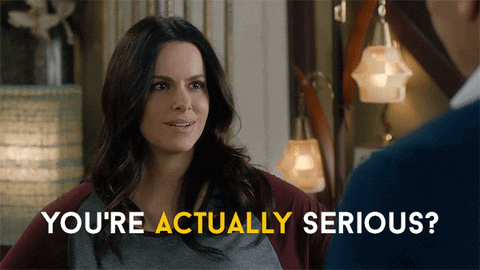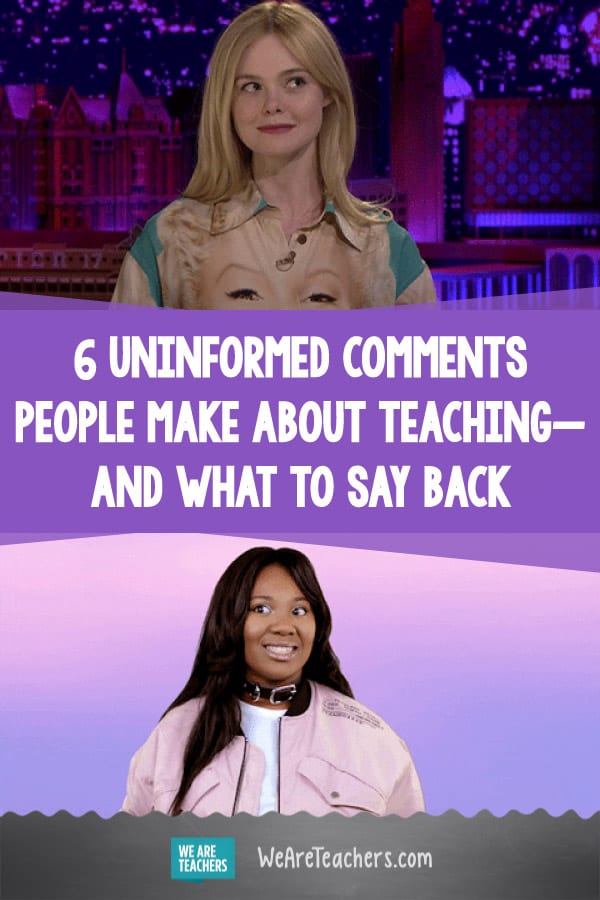When I’m at social gatherings, I often meet non-teachers who ask me questions about teaching. The vast majority of these people are kind and gracious. They’ll tell me about a teacher they had that impacted them positively or thoughtfully ask my opinion about aspects of education.
But occasionally, I’ll get someone who is walking around lugging this giant anti-teaching axe to grind. They will say something either completely rude or just passive-aggressively disparage teaching, and I have to take a moment in my head to sort through what kind of response I’d like to give that individual. Here are five such comments as well as my recommendations for how (and how not) to respond.
1. “Why do people think teaching is so hard? You get the whole summer off!”

This one is probably the most common snarky comment you’ll hear, but don’t worry. We have your response ready.
Say this:
“Well, actually most teachers are participating in professional development, doing work to prepare for the next school year, teaching summer school, or working another job to supplement their paltry income. Also, the school year is so busy and stressful that the time we do have to rest during the summer is extremely important to our well-being. But yes, it’s a common misconception that we have summers off.”
Not that:
“You’re right, it would be so nice to have summers off! To what profession are you referring so I can apply right now?”
“Double-dare you to spend a week with my fifth period. You’d need two years to recover.”
“Hmm. I don’t think you know very many things.”
[contextly_auto_sidebar]
2. “I would love to only work from 8:00 to 3:00 every day.”

This is a common misconception. Many people think that your daily hours replicate a child’s hours in school.
Say this:
“I would also love that! Teachers actually work quite a bit longer than that—my day at school is usually between 10 and 12 hours, not including my commitments during coaching season, and then on top of that the time at home spent grading and planning. But yeah, I remember thinking the same thing before I started teaching.”
Not that:
“Absolutely! It’s awesome planning my lesson as I’m delivering it to each class! And it took a while for me to learn how to grade their work as they did it and put it in the computer by telekinesis, but now I’m a champion.”
“How often do you give presentations for work?” (Wait for person to respond, “A few times a year,” “Twice a month,” whatever.) “How much planning goes into one presentation?” (Wait for person to respond, “Several hours,” “Six weeks,” or whatever amount of time.) “Huh. Interesting. I give presentations six times a day. Nine months out of the year. To children who aren’t paid to be there. Bye now.”
Simply glare and walk away.
3. “You know what they say: Those who can, do; those who can’t, teach.”

This one is just rude, and it’s pretty tempting to just let loose. Keep your cool though!
Say this:
“You might be surprised—some of the most intelligent, successful people in their fields end up making terrible teachers. There’s a lot more to it than people think.”
Not that:
“Oh, all these years I thought the saying was, ‘Those who haven’t taught, can’t talk.’ Silly me!”
“If I had a dragon, I would feed you to it.”
“And those who can do neither spout clichés.”
4. “You think 120 students is bad? I manage 200 employees—grown adults.”

You have to be a little bit careful answering this one because people can get defensive about their job, but it can be done.
Say this:
“Wow, I’m sure your job is stressful. We have that in common. Thanks for sharing!”
Not that:
“I’m so lucky to be in the presence of an expert! Tell me: What do you do when an employee doesn’t turn in work? What happens if your warnings are ineffective? What happens if one of them flagrantly and repeatedly disrespects you? You get to fire them? Huh. Interesting.”
“Can my students and I take a field trip to your place of business? Great! I won’t be joining them, since you clearly have a handle on things. I’ll make sure they all eat sugar packets for lunch.”
5. “I thought about teaching, but I really wanted to go into a profession where I’d be more challenged.”

This one is another low blow. They probably don’t even realize they’re offending you (let’s give them the benefit of the doubt), so you can stay on the high road.
Say this:
“That’s interesting, because I think my job is remarkably challenging. It requires a ton of interpersonal and management skills, and I’m constantly having to be resourceful and act under quite a few pressures and deadlines. What part of teaching is it that sounds easy to you?”
Not that:
“Totally true. In fact, I met with my principal last week and asked if I could have a pay cut. It’s just way too easy teaching classes of 35 eighth graders who are between one and three grade levels behind.”
“I’m sorry, can you repeat that? You used too many big words for a simple teacher like me to understand.”
“I thought about having this conversation with you, but I really wanted to do something worthwhile, so I’m going to go find some cheese.”
Of course, there’s always an exception.
Officially, I’m going to recommend sticking with the say-this response when you find yourself in these tricky social situations. They are diplomatic, polite responses that will hopefully engage meaningful dialogue.
(But off record, it’s pretty fun to occasionally say a not that followed by a gentle punch on the shoulder or wink and walking away, leaving the person to question how serious you were.)
Do you have clever responses to share for any of these scenarios? Come and share in our WeAreTeachers Chat group on Facebook.
Plus, 13 Other Jobs Teachers Do But Don’t Get Paid For.


